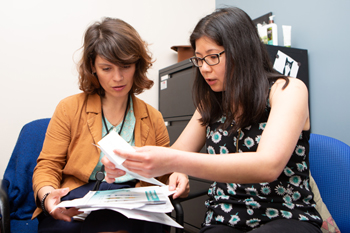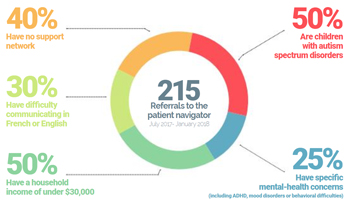Helping children with mental health issues access care and services

By Mary Dickie

Dorjana Vojvoda (left) and Arlene Mendoza worked together to find support for Brian. (Photos by Katie Cooper)
An innovative St. Michael’s initiative called the RBC Youth Navigator is providing much-needed support for children and youth with mental health issues. As part of the program, patient navigator Dorjana Vojvoda helps young patients and their families dismantle the many barriers they face when trying to access mental health care and services.
That help can be as simple as filling out a form, or it can involve finding a translator, researching financial assistance programs or just listening with a sympathetic ear.
“Getting a diagnosis is only the beginning,” explains Dr. Tony Barozzino, director of community outreach and ambulatory services for St. Michael’s Department of Pediatrics and medical director for the RBC Youth Navigator program.
“Our focus is often on children facing barriers — poverty, food and housing security, literacy — that make life challenging at the best of times, let alone with a mental health issue. We knew we could improve our support of these families, and that a connector, somewhere between a social worker and a nurse, would be beneficial.”
“Getting a diagnosis is only the beginning” – Dr. Tony Barozzino, director of community outreach and ambulatory services |
Funded by a 10-year grant from the RBC Foundation, Dr. Barozzino and his team — which now includes research lead Dr. Shazeen Suleman plus two administrators and several students — devised a pilot program, and in July 2017 St. Mike’s pediatricians started referring patients ranging from toddlers to teens.
Over 500 patients have been referred to date. More than half of them received a diagnosis of autism, including Brian Mendoza, a 14-year-old referred to the RBC Youth Navigator last fall by Dr. Joelene Huber, a St. Michael’s pediatrician who participates in the hospital’s school outreach program. Since then, Vojvoda has been helping Brian and his mother, Arlene, a single parent who also has a 17-year-old daughter with a physical disability, access the treatment and resources he needs.
“It was overwhelming at the beginning,” says Arlene, who works nights as a caregiver. “There were so many appointments, I was confused, and I don’t speak English well. One time I was supposed to go to my daughter’s appointment and I ended up at my son’s caregiver instead.”
Vojvoda, who has a background in social work, has connected the Mendozas with services and resources to improve Brian’s speech and vocabulary as well as his social interactions. She even helped Mendoza’s daughter find a walker through the Holland Bloorview Kids Rehabilitation Centre.
“Without Dorjana, I couldn’t get these things for my kids,” Arlene says. “I’m so happy I brought them here.”
One in five Canadians faces mental health challenges, with many beginning in childhood, so getting help early can make a difference.
“Anxiety is prevalent, and seven to 10 per cent have ADHD or a learning disability,” says Dr. Barozzino.
“Those issues impact you every day, and can have a huge effect on your future productivity and happiness. If we can move toward earlier intervention and better connectivity with resources – and support not just the child but the family – we’ll get better outcomes.”
“Without Dorjana, I couldn’t get these things for my kids… I’m so happy I brought them here.” – Arlene, mother of Brian |
“The biggest challenge is trying to maximize families’ incomes,” says Vojvoda. “They often can’t work, and there are language barriers. A lot of times they don’t have anyone to talk things through with. But they are so appreciative. Often it’s just having another person who will listen.”
Vojvoda is fully booked – with a waiting list – and she wants to see the RBC Youth Navigator program expanded.
“There’s a wait list for everything, and it’s just another barrier for them,” she says. “If they could avoid having a wait list to see me, that would be wonderful.”
Research into the program is continuing, and Dr. Barozzino and the team have been spreading the word.
“A number of institutions have asked to see our template,” he says. “We hope to share it. We’re fortunate to have 10 years to prove that this makes sense and that we should have two navigators, or five, or whatever the right number might be. And if we can share this, it might be great, and we’ll be leaders in this field.”
About St. Michael’s Hospital
St. Michael’s Hospital with Providence Healthcare and St. Joseph’s Health Centre now operate under one corporate entity as of August 1, 2017. United, the three organizations serve patients, residents and clients across the full spectrum of care, spanning primary care, secondary community care, tertiary and quaternary care services to post-acute through rehabilitation, palliative care and long-term care, while investing in world-class research and education.

